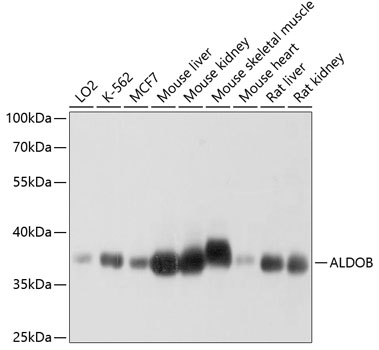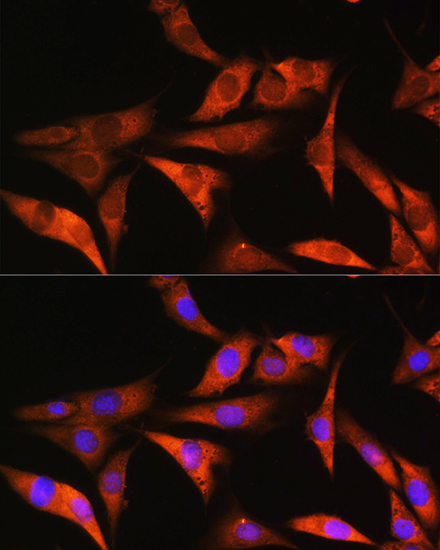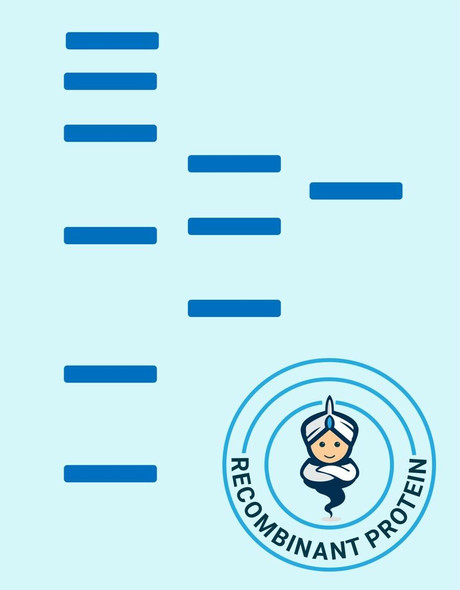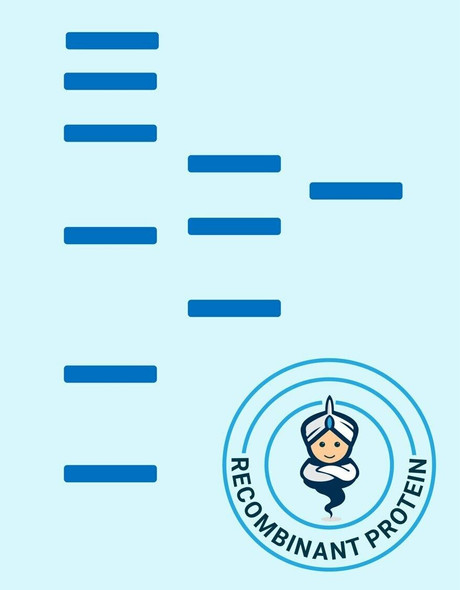Anti-ALDOB Antibody (CAB3728)
- SKU:
- CAB3728
- Product type:
- Antibody
- Reactivity:
- Human
- Mouse
- Rat
- Host Species:
- Rabbit
- Isotype:
- IgG
- Research Area:
- Metabolism
Description
| Antibody Name: | Anti-ALDOB Antibody |
| Antibody SKU: | CAB3728 |
| Antibody Size: | 20uL, 50uL, 100uL |
| Application: | WB IF |
| Reactivity: | Human, Mouse, Rat |
| Host Species: | Rabbit |
| Immunogen: | Recombinant fusion protein containing a sequence corresponding to amino acids 1-200 of human ALDOB (NP_000026.2). |
| Application: | WB IF |
| Recommended Dilution: | WB 1:1000 - 1:2000 IF 1:50 - 1:200 |
| Reactivity: | Human, Mouse, Rat |
| Positive Samples: | LO2, K-562, MCF7, Mouse liver, Mouse kidney, Mouse skeletal muscle, Rat liver, Rat kidney, Mouse heart |
| Immunogen: | Recombinant fusion protein containing a sequence corresponding to amino acids 1-200 of human ALDOB (NP_000026.2). |
| Purification Method: | Affinity purification |
| Storage Buffer: | Store at -20°C. Avoid freeze / thaw cycles. Buffer: PBS with 0.02% sodium azide, 50% glycerol, pH7.3. |
| Isotype: | IgG |
| Sequence: | MAHR FPAL TQEQ KKEL SEIA QSIV ANGK GILA ADES VGTM GNRL QRIK VENT EENR RQFR EILF SVDS SINQ SIGG VILF HETL YQKD SQGK LFRN ILKE KGIV VGIK LDQG GAPL AGTN KETT IQGL DGLS ERCA QYKK DGVD FGKW RAVL RIAD QCPS SLAI QENA NALA RYAS ICQQ NGLV PIVE PEVI PDGD HDLE |
| Gene ID: | 229 |
| Uniprot: | P05062 |
| Cellular Location: | Cytoplasm, centriolar satellite, centrosome, cytoskeleton, microtubule organizing center |
| Calculated MW: | 39kDa |
| Observed MW: | 39kDa |
| Synonyms: | ALDOB, ALDB, ALDO2 |
| Background: | Fructose-1, 6-bisphosphate aldolase (EC 4.1.2.13) is a tetrameric glycolytic enzyme that catalyzes the reversible conversion of fructose-1, 6-bisphosphate to glyceraldehyde 3-phosphate and dihydroxyacetone phosphate. Vertebrates have 3 aldolase isozymes which are distinguished by their electrophoretic and catalytic properties. Differences indicate that aldolases A, B, and C are distinct proteins, the products of a family of related 'housekeeping' genes exhibiting developmentally regulated expression of the different isozymes. The developing embryo produces aldolase A, which is produced in even greater amounts in adult muscle where it can be as much as 5% of total cellular protein. In adult liver, kidney and intestine, aldolase A expression is repressed and aldolase B is produced. In brain and other nervous tissue, aldolase A and C are expressed about equally. There is a high degree of homology between aldolase A and C. Defects in ALDOB cause hereditary fructose intolerance. |
| UniProt Protein Function: | ALDOB: Defects in ALDOB are the cause of hereditary fructose intolerance (HFI). HFI is an autosomal recessive disease that results in an inability to metabolize fructose and related sugars. Complete exclusion of fructose results in dramatic recovery; however, if not treated properly, HFI subjects suffer episodes of hypoglycemia, general ill condition, and risk of death the remainder of life. Belongs to the class I fructose-bisphosphate aldolase family. |
| UniProt Protein Details: | Protein type:Carbohydrate Metabolism - fructose and mannose; Carbohydrate Metabolism - glycolysis and gluconeogenesis; Carbohydrate Metabolism - pentose phosphate pathway; EC 4.1.2.13; Lyase Chromosomal Location of Human Ortholog: 9q21.3-q22.2 Cellular Component: microtubule organizing center; cytosol Molecular Function:identical protein binding; protein binding; cytoskeletal protein binding; fructose-bisphosphate aldolase activity; ATPase binding Biological Process: fructose 1,6-bisphosphate metabolic process; NADH oxidation; glycolysis; positive regulation of ATPase activity; carbohydrate metabolic process; glucose metabolic process; pathogenesis; fructose catabolic process; gluconeogenesis; fructose metabolic process Disease: Fructose Intolerance, Hereditary |
| NCBI Summary: | Fructose-1,6-bisphosphate aldolase (EC 4.1.2.13) is a tetrameric glycolytic enzyme that catalyzes the reversible conversion of fructose-1,6-bisphosphate to glyceraldehyde 3-phosphate and dihydroxyacetone phosphate. Vertebrates have 3 aldolase isozymes which are distinguished by their electrophoretic and catalytic properties. Differences indicate that aldolases A, B, and C are distinct proteins, the products of a family of related 'housekeeping' genes exhibiting developmentally regulated expression of the different isozymes. The developing embryo produces aldolase A, which is produced in even greater amounts in adult muscle where it can be as much as 5% of total cellular protein. In adult liver, kidney and intestine, aldolase A expression is repressed and aldolase B is produced. In brain and other nervous tissue, aldolase A and C are expressed about equally. There is a high degree of homology between aldolase A and C. Defects in ALDOB cause hereditary fructose intolerance. [provided by RefSeq, Dec 2008] |
| UniProt Code: | P05062 |
| NCBI GenInfo Identifier: | 113611 |
| NCBI Gene ID: | 229 |
| NCBI Accession: | P05062.2 |
| UniProt Secondary Accession: | P05062,Q13741, Q13742, Q5T7D6, |
| UniProt Related Accession: | P05062 |
| Molecular Weight: | Calculated MW: 39kDaObserved MW: 39kDa |
| NCBI Full Name: | Fructose-bisphosphate aldolase B |
| NCBI Synonym Full Names: | aldolase B, fructose-bisphosphate |
| NCBI Official Symbol: | ALDOB |
| NCBI Official Synonym Symbols: | ALDB; ALDO2 |
| NCBI Protein Information: | fructose-bisphosphate aldolase B; aldolase 2; liver-type aldolase; aldolase B, fructose-bisphosphatase |
| UniProt Protein Name: | Fructose-bisphosphate aldolase B |
| UniProt Synonym Protein Names: | Liver-type aldolase |
| Protein Family: | Fructose-bisphosphate aldolase |
| UniProt Gene Name: | ALDOB |
| UniProt Entry Name: | ALDOB_HUMAN |







